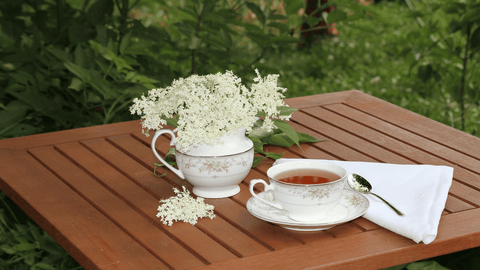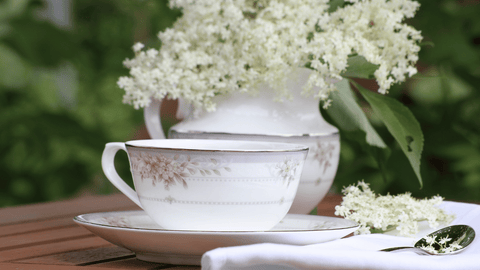Exploring the Benefits of Elderflower Tea During Pregnancy

Elderflower tea, derived from the blossoms of the elder tree, is renowned for its delicate floral aroma and numerous health advantages. This herbal tea offers a range of benefits, from enhancing immune function to providing anti-inflammatory properties, making it a popular choice for health enthusiasts. Specifically, the benefits of elderflower tea during pregnancy are noteworthy, given the need for natural, gentle remedies during this sensitive period.
Safety Profile of Elderflower Tea in Pregnancy
When considering elderflower tea during pregnancy, it's crucial to focus on safety. Health experts generally regard elderflower tea as safe for pregnant women when consumed in moderation. However, it's essential to ensure that the tea is caffeine-free and devoid of any mixed herbs that might not be recommended during pregnancy. Pregnant women should always consult with their healthcare provider before incorporating any new herbal tea into their diet.
Health Benefits of Elderflower Tea for Pregnant Women

Immune System Support
One of the key benefits of elderflower is its ability to bolster the immune system. During pregnancy, a woman's immune system is naturally suppressed, and elderflower tea can be a beneficial supplement thanks to its antimicrobial and anti-inflammatory properties, which help protect against common illnesses.
Anti-inflammatory Benefits
The anti-inflammatory properties of elderflower are especially beneficial in managing pregnancy-related inflammation and minor swelling, making elderflower tea benefits in pregnancy a topic of interest for many expecting mothers.
Skin Health
Regarding elderflower benefits for the skin, this tea can enhance skin health by promoting better hydration and circulation, leading to a more radiant complexion. This is particularly appealing during pregnancy when hormonal changes can affect skin conditions.

Allergy Relief
Elderflower tea's traditional use in alleviating allergy symptoms also extends to pregnant women, who may find natural relief from seasonal allergies through its consumption, thanks to its anti-inflammatory and mild antihistamine effects.
Rich in Antioxidants
Elderflower is a good source of antioxidants, such as flavonoids and phenolic acids. These compounds help protect the body against oxidative stress and cellular damage. For pregnant women, antioxidants are vital as they contribute to overall health and can support the body's natural defence system.
Supports Digestion
The soothing properties of elderflower tea can aid digestion and relieve common digestive issues which are frequent during pregnancy. This can include symptoms like bloating, constipation, and indigestion. By promoting smoother digestion, elderflower tea can help maintain a comfortable pregnancy experience.
Hydration and Diuretic Properties
Proper hydration is crucial during pregnancy, and elderflower tea can be a pleasant way to increase fluid intake. Additionally, its mild diuretic properties can help manage fluid retention, a common issue in the later stages of pregnancy.
Stress Relief and Calming Effect
The natural calming properties of elderflower tea can be beneficial in managing stress and anxiety during pregnancy. Its mild sedative effect can help improve sleep quality and promote relaxation, which is essential for both maternal and foetal health.
Precautions and Guidelines
While elderflower tea offers several benefits, it's important for pregnant women to consult with their healthcare provider before incorporating it or any new herbal remedy into their diet. This is crucial to ensure safety and address specific health concerns or conditions. Always choose high-quality, organic elderflower tea and consider caffeine-free options to avoid any potential risks associated with caffeine intake during pregnancy.

Nutritional Contributions of Elderflower Tea
Elderflower tea is a good Vitamin C source, essential for maternal health and foetal development. The antioxidants present in elderflower help combat oxidative stress, contributing to the overall wellness of the mother and the developing baby.
Recommendations for Consumption
To safely enjoy the benefits of elderflower tea during pregnancy, it's recommended to consume commercially prepared, caffeine-free elderflower tea. Pregnant women should limit their intake to a few cups per week to avoid any potential adverse effects. Always choose high-quality, organic elderflower tea to ensure it is free from harmful contaminants.
Here are detailed guidelines on the advised quantities forms of elderflower tea and tips for selecting and preparing it to maximise health benefits and ensure safety during pregnancy:

Advised Quantities and Forms
-
Moderation is Key: As with many herbal teas, moderation is crucial. Pregnant women are generally advised to limit their intake of elderflower tea to no more than 1-2 cups per day. This precaution helps avoid any potential adverse effects from overconsumption.
-
Caffeine-Free Options: Ensure that the elderflower tea selected is naturally caffeine-free. Caffeine consumption during pregnancy should be limited to avoid potential risks like increased heart rate and blood pressure.
-
Commercially Prepared Teas: Opt for commercially prepared elderflower teas rather than homemade versions. Commercial teas are typically regulated and provide consistency in the strength and safety of the product. This is particularly important to avoid any improperly prepared concoctions that may contain harmful concentrations of elderflower.
Tips for Selecting and Preparing Elderflower Tea
-
Choosing the Right Product: Look for high-quality, organic elderflower tea to ensure it is free from pesticides and other harmful chemicals. Organic certification can generally be a reliable indicator of product quality.
-
Reading Labels Carefully: Check the ingredient list to ensure no additional herbs or additives are not recommended for pregnant women. Some herbal blends might include ingredients that are contraindicated during pregnancy.
-
Preparation Method:
-
Steeping Time: Brew the tea according to the package instructions, typically steeping the tea for about 5-10 minutes. Over-steeping can lead to powerful tea, which might increase the likelihood of side effects.
-
Water Temperature: Use boiling water to steep the tea to help effectively release all the beneficial properties while ensuring any harmful bacteria are killed.
-
Avoiding Additives: When preparing elderflower tea, avoid adding extra herbal supplements without advice from a healthcare provider. Sweeteners, if desired, should be used sparingly. Natural sweeteners like honey (for those over one year old) or pure maple syrup are preferable but should be used judiciously to avoid excess sugar intake.
-
Consultation with a Healthcare Provider: Before adding elderflower tea to a pregnancy diet, it's advisable to consult with a healthcare provider, especially for those with pre-existing conditions or who are on medication that might interact with herbal products.
Precautions and Potential Side Effects
While elderflower tea is generally safe, it is possible to experience gastrointestinal issues if consumed in excess. Pregnant women should start with small amounts to gauge their body's response and discuss any concerns with their healthcare provider.
Hydrate Herbal Tea a Beneficial Product
For those looking to enhance their hydration and enjoy the soothing benefits of herbal teas during pregnancy, Mother Cuppa Tea offers a wonderful product, the Hydrate herbal tea. This hydrating herbal tea is ideal for maintaining proper hydration, especially during pregnancy. It's naturally flavourful, caffeine-free, and contains zero calories, aligning perfectly with the needs of a pregnant mother seeking to manage hydration with safe, natural solutions.








Leave a comment